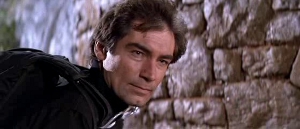
Introduction: Why Novels Are Better Than Films (Bond)
Enter Timothy Dalton, to the collective dismissal of a generation. Not my generation, mind – I was four at the time and at least a year away from achieving what I’d call “consciousness.” I speak of the previous generation of Bond fans Roger Moore created with his twelve year stint in the tux…and the generation before that, who grew to see Moore’s films as a fundamental betrayal of Ian Fleming’s creation and his suave, snarky, seemingly-detached counterpart Sean Connery and Richard Maibaum created.
Neither group seems particularly concerned with the fact Bond-the-character-in-these-films is an empty suit. As with most literary characters, translating Bond into film removes the one thing that made him bearable in prose: third-person-limited narration. Fleming’s novels are built out of it, their prose colored by Bond’s oft-irredeemable opinions on life, the universe, and everything. He’s exactly the type of “stiff-assed Brit” you’d expect to meet in the better clubs of mid-50s London: defiantly prim and proper; fussy and cynical and racist. Always making snap judgments on the most superficial of things*. But also experiencing the full range of human emotion in a way none of his actors can. They don’t have the time – most of their movies are already too long and none of the Connery or Moore films dared pause to show Bond agonize over a decision, or ruminate on a long life of forcing himself to do horrible things to worse people.
[*My favorite of these comes in the novel Moonraker – which had little to do with the movie Moonraker apart from the villain, Hugo Drax. Bond decides Drax is The Villain, not only because the man cheats at bridge, but because he sweats while he does it.]
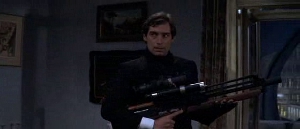
Whatever their faults, at least the Bond films of the early-80s tried to flesh out the flat archetypes who inhabit Bond’s film-world. Look at For Your Eyes Only, which Frankensteined two short stories into my favorite post-Moonraker Moore film. Or Octopussy, which turned a one-off with a snicker-inducing title into its titular character’s Defining Element of Tragedy. But the the last time Bond got any character development, back in 1969, almost everyone cried foul.
The Observer’s Tom Milne, “fervently trust[ed On Her Majesty’s Secret Service would] be the last of the James Bond films,” because the series seemed to wrap itself up in a nice, neat bow of tragedy. I fervently trust Milne’s quote will go down in history as movie criticism’s own “Dewy Defeats Truman.” His colleague across the pond, Village Voice critic Molly Haskell – one of the proud few who gave OHMSS the time of day – found her audience hissing like English primary school children. Both noticed the same thing: an audience that didn’t want Bond to develop. His doing so introduced a dangerous element of change.
If you wanted to be cynical (and for some of us, it’s not a question of “want”) you could see the entire Moore Era as a twelve-year-long holding pattern. EON survived Stagflation and trickle down economics by getting into the Cinematic Comfort Food business. As with any comfort food, the results are filling…but nutritionally dubious…and a steady diet can make you sick of anything, even if it’s your favorite. Ask this year’s crop of college freshmen how they feel about cheap pizza in about six months. My research suggests Bond fans felt the same in 1983.
Part 1: Happenstance
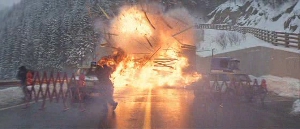
That’s the year US Magazine ran a poll, asking readers to pick the next Double-Oh Seven. A then-thirty-year-old TV actor named Pierce Brosnan won by a country mile due to his titular role in then-recent hit series Remington Steele. After that, a lot of “ifs” start crashing into each other. If Kevin McClory hadn’t gone ahead and made Never Say Never Again…if EON, skittish of competing against the First Bond, hadn’d convinced Moore to play the Third again…and again…if NBC head Warren Littlefield had just let Brosnan’s contract expire over the summer of 1986…if Timothy Dalton had accepted the role when Cubby Broccoli first offered it to him, back in the late-60s…if any number of other things had happened just a little bit differently…the Brosnan Era would’ve begun eight years earlier.
A lot of Bond fans figure it should have, allowing them to dismiss Dalton outright instead of puzzling over the two films he headlined. The Living Daylights is barely remembered at all, save with a shrug an a “meh…it’s alright.” Because it really is par for this franchise: a decent Cold War spy-fi story that contains (most of) the familiar tropes: gadgets, guns, gorgeous girls, an Aston Martin (which Moore’s Bond never drove) and a Good Guy Army to blow things up during the climactic battle. Unfortunately, by this point, there are fourteen other films just like it in this series alone. No one went into The Living Daylights without some preconceived notion of what (or whom) James Bond should be.
All of which means Dalton came to the role with the undeserved reputation of an usurper – a Shakespearean charlatan, talking down to us commoners at a time when everyone behind the camera seemed content to coast on autopilot…as I think A View to a Kill proves. Dalton had the unmitigated gall to actually put in some effort, prompting a natural human desire to hammer down this loose nail. How dare he appear to give a shit? Where does he get off, reading Fleming’s books? Referencing them on-set? Doing his own stunts!?
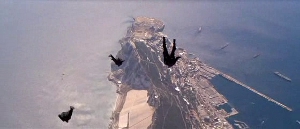
Bad enough the guy makes Ah-nuld and Sly look bad; he had to go and play the role seriously, “ruining” everyone else’s so-called “fun.” In a post-Mark Kaminsky/Marion Cobretti Age, the Moore Era’s light heart and self-referential sense of humor were the only things distinguishing Bond movies from the rest of the Action genre. So went mainstream critical thought at the time (with Roger Ebert leading the charge). Everyone knows these films are ridiculous, so why shouldn’t the film know it, too?
Part 2: Coincidence(?)
Yet I think creative exhaustion prompted this move towards a more “serious” James Bond as much as demographic research or the lead actor’s performance choices. After Moonraker Bond’s creators had no choice but to rip their plots out of the headlines and try to make a new Bond for a new age. Even A View to a Kill is just Goldfinger for the middle-80s. Living Daylights, then, is a Détente Era From Russia with Love. Once again, Bond teams up with a hot, naive, blond, Soviet civilian, whom he hopes will lead him to his objective. As before, the two “fall in love” over the course of their shared adventure and I don’t really buy it.
Because this is Bond, James Bond. He treats women like potato chips, even in this, the film with supposedly “just one” Bond Girl. He still delays reporting in the deaths of two fellow Double-Ohs during the pre-credit sequence to shag a unnamed Mediteranian bimbo. Because he landed on her boat. I’m sure Double-Oh Four and Two would understand, James. You asshole.
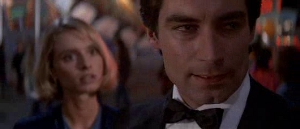
That’s just it, though: Timothy Dalton was the first actor honestly unafraid to play Bond as the asshole I always saw in Fleming’s books. Much as I find that Bond and everything he stands for contemptible, I appreciate that – over his run of twelve novels and two short story collections – he became a very nuanced, three-dimensional asshole. A character. Instead of an actor playing a character (and being bored with/self-conscious about their role to boot). There’s an ice in Dalton’s eyes and a manic, PTSD energy in his face that makes him the first actor I genuinely believe as that character. At the same time, he does things – like laugh, or get incredibly pissed, or scan a crowd suspiciously with his face in extreme close up, so we can watch his eyes roll across faces in the crowd like the heavy machines they are – that reveal a humanity characters often lack after five films, never mind fifteen. After two decades of declining returns, watching Dalton is like being slapped in the face with a Swiss avalanche. I’d honestly forgotten what an enthusiastic Bond performance looked like.
Shame about the rest of the movie.
Part 3: Enemy Action
If this were any other superhero film, I’d chalk its problems up to “Villain Squeezing,” which hobbles things here for the same reason it hobbled Octopussy and FYEO: we don’t spend enough time with either villain. The defecting Russian General Georgi Koskov (Jeroen Krabbé) gets caught in the Kristatos Paraodox and wastes his screentime pretending to be good. American arms dealer and blatantly Not-Ollie North Brad Whitaker (Joe Don Baker) is…Joe Don Baker as a megalomaniac military fetishist. The kind of guy who re-enacts famous battles with dioramas instead of action figures.
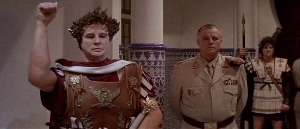
Both give interesting performances that feels entirely out of place next to Dalton’s. Krabbé is too lightweight to pull off “rogue Russian general” especially since the last one we saw was Octopussy‘s General Orlov, a crazed crypto-Nazi. Georgi’s more of a jovial, two-faced uncle, even when he’s not trying to fool anyone – the kind who makes you pat your wallet, just to make sure it’s still there. His Evil Plan seems to revolve around duping the Soviet Military into finanacing his early retirement by having them pay Whitaker for arms so Whitaker can pay Koskov for heroin and both can live like kings in Whitaker’s palace/home. No real menace in all that, is there?
Baker couldn’t be menacing in a Hitler outfit – as this film outright proves. Considering he’s the one who gets the final shoot out with Bond, you’d think he’d have more screen time. Really, General Koskov and Whitaker should’ve been combined into one character called General Koskov, streamlining the plot mightily.
Past that, the film rests on a foundation of Bond’s relationship with Czech cellist Kara Milovy (Maryam d’Abo). Meant to think she’s a KGB assassin intent on preventing Koskov’s defection, Bond refrains from killing her when his instincts tell him she’s not a pro. Most of the film follows Bond as he tries to get in good with Kara – his only lead to Koskov and Whitaker’s plan…and while I like seeing Bond go from charming liar, feeding a mark his cover, to annoyed bodyguard protecting the woman he “loves”…their journey feels forced and rushed.
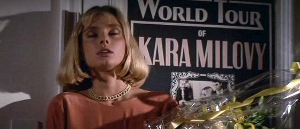
That’s not d’Abo’s fault: she’s an incredibly intelligent, talanted actress. Kara, on the other hand, is a sheltered scholarship kid from behind the Iron Curtain. Ya know: a stereotype. She oscillates from competent (even getting one over on Bond at one point) to breathlessly air-headed (“Well, at least we’re together.”) to downright bad-ass (leading the Good Guy Army charge by shaming the Good Guy Army’s leader into charging) thanks to an inconsistent script. She doesn’t have a character arc – she has convenience. This ensures she and Bond will have a completely conflict-free relationship.
Kara’s is a Cinderella story from the Cold War’s dying days, with Bond as her Prince Charming and Fairy Godmother. We’re supposed to go, Of course she melts for him – he buys her pretty things and takes her to opera matinees in the 2nd most beautiful city on planet Earth – Vienna! Textbook Mary Sue bullshit, especially next to Bond Girls of the past. I’m more concerned about why he’s doing all this. Is it just how he rolls, being “Bond. James Bond” and enjoying the finer things in life so much he’ll bribe the Ferris Wheel guy to stop the ride so he and Kara can join the fifty-feet club? Is any of his affection genuine? We don’t know, and I don’t think we can in a purely visual medium. You’d have to add something intrusive and stupid, like voice over narration, and that way lies madness. Ask Frank Miller.
Of course we know Dalton’s reactions aren’t genuine – he’s an actor, playing a part, with access to much more information than we. He could walk right up to John Glen or Richard Maibaum and ask questions, or interject his own ideas about motivation into the scene. Ideas that are never discussed in these scripts, which stopped paying attention to Bond’s life outside spywork when they gambled (correctly) we’d all forget Sylvia Trench ever existed.
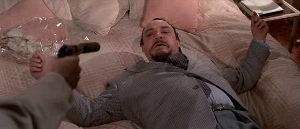
A little bit of retoractive continuity is fine – the series rarely shouts out to its own past, anyway. But in this film, the retconns start to pile up, evidence The Living Daylights was meant to be a full-on reboot at some point. We have a new head of the KGB, General Pushkin (John Rhys-Davies) to go with our new Bond, and like Bond, Rhys-Davies’ role was originally meant for another actor. Walter Gotel, whose General Gogol appeared in the last five Bond films, was supposed to be our (no pun intended) Red Herring in this one, but Gotel’s failing health prevented anything beyond a cameo.
Not that Gimli son of Gloin isn’t the best damn thing about this movie, as is often true when he’s involved…but his character comes with a relationship to Bond that must’ve happened in a film we never saw. As does Bond’s Local Contact, Saunders (Thomas Wheatley), head of Station V, Vienna, who tells Bond to “forget the ladies for once” with the cattiness of someone in the know. Everyone in the film recognizes Bond on sight, and we’re supposed to…even though he’s now the reverse of the Bond we saw two years prior. Young, athletic, coldly brutal instead of aging, punny and prone to trading places with stuntmen.
The Fourth Bond also has a higher body count than his predicessor, despite telings Saunders “I only kill professionals.” Right, James. Tell me another. Would any of the three previous Bonds have said the same? Professional whats, Double-Oh Seven? Supervillains? He kills plenty of people here, thanks to the new car – which probably did a lot to inspire the Batmobile we’d all see two years later – and the fifth ski chase sequence in these films. If once is happenstance, twice is coincidence, and three times is enemy action, what does that make five? Can we make it the last, please? No more, no mas, no bueno.
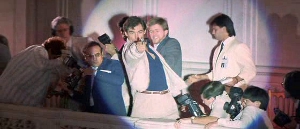
By the end, Bond’s hanging off the back of an airplane, fighting a blond henchman (Andreas Wisniewski), and I can’t care anymore, despite Necros being somewhat cool in all of one scene. The climax with Whitaker is as anti-climactic as these Final Showdowns can get. Remember when Bond used to throw down with memorable henchmen, like Wint and Kidd, or Teehee Johnson? Is that what Whitaker’s supposed to be? Then why does he give Koskov orders? Why does Koskov get to live after taking a airplane to the face? So we can have a scene where Krabbé’s talent wilts like a blade of grass before the shinning power of Professor Arturo? I’m all for that…so why not make him the villain? Christ sakes, he’s John Rhys-Davies! Watching this film waste such a precious natural resource is physically painful. Not even a foot chase across the rooftops of Interzone (which would go on to inspire a similar chase in another Bond film, almost twenty years later) can stop me from ending this film in a relative funk.
Because honestly, The Living Daylights is another shaky, soft reboot of James Bond. It’s the Bizzaro version of Live and Let Die: instead of a Bond-in-Saint’s-Clothing and his poorly written Girl vs. a pair of decent villains, we have a strong Bond vs. weak villains and the most committee-designed, “normal” Girl thus far. All trapped in a film I wish were better, or at least more memorable, than all the real world drama that created it. I’m officially pinning all my hopes on License to Kill. Baron Samedi, have mercy on it, and the rest of us, too.
![]()
![]()
![]()

I really wish the whole SMERSH front actually lead up to something interesting, especially after it was the basis for the excellent pre title squence. Instead, we get a collection light weight villains doing mundane criminal activities. Really, who cares if Bond didn’t blow up that plane ? Who cares if Koskov or Whitaker is or isn’t captured or killed ? Necros is mildly interesting because he’s the one who seems to be doing something while the others are just barking orders or explaining this needlessly convoluted plot. There is no doubt Dalton was the only appeal of this film and though he seemed a little stiff when delivering the humor, he did a good job. Too bad he would be so horribly misused in the next film.
We’re supposed to care about “dee plane, dee plane” due to the fact it contains DRUGS(!) and this is only five years after Nancy Reagan began her “Just Say No” campaign, teaching schoolchildren across the country to never trust anything an adult tells them. Especially not on the subject of lifestyle choices.
“Light weight” is right. Whitaker should’ve been Ollie North. He’s got the jingoistic posturing and military pretension down. The producers wanted to do something topical and modern, but feared offending the mouthbreathing Ollie enthusiasts in the audience…of which there were many in 1987’s America, the Bond movies major market. (Unfortunately, there still are. And by now they’ve all had children who’re all buying Call of Duty games because Ollie tells them to). Having John Rhys-Davies undercut Whitaker in Whitaker’s first scene only compounds the error. It’s a pointless, self-defeating choice…unless you proceed from the assumption that someone has to feed Whitaker’s backstory to the audience. That we have to hear, point blank, that Whitaker got expelled from West Point, establishing a nice comfortable distance between this villain and the American military. As far as my fellow Americans are concerned, the Defense Apparatus is the most trusted institution in the country. An institution beyond reproach that must never be criticized or questioned lest the Commies/Drug Lords/Terrorists “win” whichever Endless War we’re fighting this year. A fact that keeps me up at night, feeling no end of Fear.
Despite all the nasty things I’ve said (and will continue to say) about the Bourne franchise, at least they dare to paint a picture of Modern Spying as an underworld of Black Bags, lies, bullshit and spite, with illegal human experimentation going on behind every anonymous door. More realistic, that, then the Bond franchise’s lifestyle porn. And that’s the last time I’ll unironically apply the word “realistic” to either the Bond or Bourne.
Well, the point of Bond is “lifestyle porn” even the books which were far more cynical and criticized the crumbling British empire did maintain an element of glamor. As for the film, it’s desperation to be politically neutral is not surprising because the series has been to some degree. In From Russia With Love, the bad guys were changed to SPECTRE instead of the real life Soviet apparatus SMERSH. In On Her Majesty’s Secret Service, Blofeld’s plot was changed from solely targeting England, thanks to possible Russian financing, to a world wide crisis were no country is the bad guy.
As for Oliver North, that whole Iran Contra affair would not only play a part in this film but the following film Licence To Kill with the fictional Isthmus City obviously doubling for Panama under the Noriega regime.
This film did come out in a time when “political neutrality” started to become the watchword of the hour, more or less. I remember reading a newspaper article about the videogame industry, and there was a paragraph-long complaint by one interviewee as to why there was a Contra videogame but no game named for the Sandinistas…and I didn’t even know (then as now) which side I was supposed to be rooting for anyway. With the Soviet-Afghan war as a backdrop–a conflict which both Great Britain and the U.S. were technically neutral, and God help the world if the U.S. got caught helping the mujaheddin, ’cause WWIII was a phone-call away if that happened–it becomes even more important to draw an unassailable line around the bad guys. And what could be more unassailable than the bad guy of the hour in 1987, the narco-trafficker? (Having them deal in what we would now call “conflict diamonds” helps a lot, too.)
The thing that really weighs against this film is that it completely wastes a prime opportunity to establish a new enemy that has MI6 directly in its sights. Remember the fellow with the milk-bottle grenades that was able to raise havoc inside an MI6 safe house? Or how Saunders gets offed by the sliding glass door (just when he and Bond seemed like they might get along)? Didn’t those scenes just scream “mole”? Wouldn’t that have been the perfect time to establish a new SPECTRE for 007 & Co. to fight? Unfortunately, we’d have to wait two more Bonds before Quantum showed up.
(By the way, when I read your comments about Maryam d’Abo being a competent actress, I started thinking that that couldn’t have been the same person I remembered. Then I realized that it wasn’t–I’d been thinking of Olivia.)
I would have settled for an interesting villain doing something worth watching for over two hours. I also would have loved the original idea for a reboot.
I was ten when this came out, and I loved it. I loved Dalton’s Bond, I loved the globe trotting adventure, the exotic locations, the cool car, the action sequences, the Muhajadeen.
I watched this again just shy of four years ago, and I mostly agree with you, but I have a strong nostalgia pull for this, the first Bond movie I saw in a theater that I loved (I’d seen Octopussy, Never Say Never Again and A View to a Kill in theaters as well). The film is hurt by weak villains and a plot that is overly complex for what you get out of it. I can deal with the now ironic Afghanistan scenes, but the fact that they wussed out on making Joe Don Baker a good ole boy Ollie North definitely throws away the only possible way he could work as a Bond villain. I minded D’Abo less than you did, and by your disdain of the ski scenes I’m going to guess you haven’t done much down hill skiing. Maybe that’s why I like those scenes so much more than you, I’m not sure. One thing is for sure: Dalton got a raw deal. Can you imagine him in, say, a script as good as On Her Majesty’s Secret Service? It’s a shame because I like the guy. He’s easily my third favorite Bond, and Lazenby only gets a pass because the movie he was in was so damned good.
I always considered Dalton’s debut as Bond as occurring after the PTS which is something you never saw before or after in any Bond film. That opening sequence could have fit for any Bond; It was clearly just to reel the audiences in. When we get to mission to get Koskov out, that is Dalton’s Bond. He’s exactly like Bond from the dark, brooding short story; jaded and tired of the killing he has done and not looking forward to yet another assassination.
I can easily imagine that, and wish I could bribe a loa or three to make it happen. I can remember being ten and watching this in the lead-up to GoldenEye…but as I said, barely remembered the film itself. And considering it now regularly shows up in holiday season Bond marathons, this gets even more embarrassing. I’ve caught pieces of it over and over again for the last four years, whenever it’s been on TV at my parent’s house. I don’t mind the complexity one bit now that I’ve survived the Bond films of the 70s. But for all that, we wind up with the Standard Bond Ending: Good Guy Arm, ‘splosions, fight with henchman, fight with final boss, end.
You’re completely correct about my lack of down hill skiing experience. The mere thought makes my bad knee sing. And thanks to this series, I’d probably spend the entire time trying to look over my shoulder for machine-gunners.
Well, it’s not the complexity, so much, it’s that it doesn’t amount to a whole lot. Also, none of us have mentioned how terrible John “Jack’s Dad” Terry is as Felix Leiter. Because he’s pretty terrible.
Trust me, HALF the fun is expecting the machine guns to start firing any time. So did I love skiing because I loved Bond movies, or do I still enjoy the ski sequences in Bond movies because I used to ski? I have no idea. Fact of the matter is now, it’s too expensive, and I don’t have many friends who ski, so I don’t bother anymore.
Could you imagine if Terry returned for Licence To Kill ? That would have been hilarious.
If by “hilarious” you mean “painful,” then yes.
“What are you trying to do, Sanchez ? Start World War THREEEE ?
“One thing is for sure: Dalton got a raw deal. Can you imagine him in, say, a script as good as On Her Majesty’s Secret Service?”
Dalton definitely got a raw deal. I think it’s because the first film doesn’t know what to do with him. As David says, he’s the first actor who stepped into the role to give a shit. Obviously elements were changed when he took the part, but other parts of the film retain the shadow of Roger Moore (Who I did like as Bond). Thus we get sequences that are out of place. The opening sniper sequence, Dalton’s reaction to Saunders’ death, and the fantastic scene between Bond and Pushkin in the hotel room seem to belong in a different film.
To give Dalton credit, he really tries hard no matter how ridiculous the script gets around him. He plays the cello escape scene for all it’s worth. Roger Ebert took exception to Dalton playing the scene like it was real, and I think he was dead wrong. The scene works because despite the fact we know the case is rigged, Dalton and D’Abo are there, and they don’t betray once to the audience that they know there isn’t a fart’s chance in a windstorm this would actually be pulled off.
Same with the tricked out Aston Martin. There’s no joking about ejector seats. The sequence works because Dalton keeps it businesslike. He pops out outriggers and laserbeams cop cars like it’s the standard training exercise for all 00s.
While the film officially becomes Dalton’s after the PTS, I still think it’s Dalton’s from the moment we see him on camera. The close-up of his face as he hears 004 is, IMO, the second-best Bond introduction in the franchise (I’ve got to give Connery props for Dr. No, even if he is my 2nd favorite Bond after Dalton) What makes it Dalton’s is his physicality. We see him running. We see him jump on the car. We see him hanging on it for real when it’s speeding away. This is stuff we hadn’t seen in a Bond film for a hell of a long time, and shows within the first five minutes that we’re not going to noticeably see Bond change to an obvious stuntman in the action sequences.
I think the relationship with Kara also progresses just fine. He’s playing it up before Saunders dies, just trying to gain her trust. After Saunders dies, we visually see him switch off. He treats Kara as if she herself got Saunders killed when he drags her away from the carnival. After he “Assasinates” Pushkin, in the scene in the hotel, he’s realized that he’s been treating her like an asshole, and tries too lae to make amends. But when they’re on the plane, he’s officially her protector now, and while she exasperates the f*ck out of him on more than one occasion before the end, (His eyeroll when he can’t initially communicate with her to get into the plane is a prime example) he can’t deny that he cares for her. When she celebrates the fact that they’ve gained the upper hand against the Russian prison guards, and he sarcastically reminds her they’re a long way from free, Dalton plays it perfectly. “Oh….You.” And i especially think the scene after he’s met with Kamran Shah is one of the best in the franchise. “Are you calling me a horse’s arse?” Her slide from tears to laughter, and Bond’s own, have cemented the relationship. Sure he’s an asshole around her sometimes, like when she’s desperate to get her cello back. But that’s Bond, Fleming’s Bond. Despite the fact that he cares for her and wants to protect her, he’s still a ruthless bastard at heart, someone who treats an intimate relationship with a woman as a foreign object. And Kara ends up falling for him, bastard traits and all. She realizes after she’s drugged him that despite his tendency to be a dick, he’s been trying to protect her all this time, even if it was just to use her for information at the start.
Getting back to the Pushkin scene. Wow. I also think this is the best confrontation the franchise ever put out. It puts Craig’s scene with Dryden to shame, though that’s a great scene also. Dalton and Rhys-Davies are letter perfect, Bond’s ruthlessness with Pushkin’s mistress is totally in line with Fleming’s Bond, and Dalton plays the scene so perfectly that even though we as an audience know that Bond knows he’s being played by Koskov, we’re still on the edge of our seat because Dalton is so hyper-tense that we do wonder if he’s going to make the wrong call and plug this poor bastard in the back of the head.
The film has definite flaws, mainly because of EON’s attempt to have things both ways. They obviously want Bond to go in a new direction, and Cubby and Dalton talked at length about the fact that he wanted to take Bond back to Fleming, and Cubby was 100% behind that decision, but they can’t help but shoehorn in some of the tropes that got them in trouble in the past, like the “Ghetto Blaster” or the need for Bond to have a car packing rockets. Overall, I enjoy the film, and it’s my 2nd favorite after “LTK”, but it’s never 100% Dalton’s.
While he never got a script as good as OHMSS, Dalton did get to do the best follow-up to OHMSS that the franchise ever put out. Anyone who thinks Bond’s sudden dedication to Leiter makes him quit the service to go after Sanchez is only getting half the story. The garter scene is there for a reason. It seems like Bond and Della at one time had an intimate relationship (She sure kisses him a Hell of a lot) but she doesn’t find out he was married from him, it’s from Felix. And Bond, being a classy fellow, doesn’t raise a fuss when she gives him the garter, but he clears out in a Hell of a hurry, seemingly running from memories of Tracy.
But he can’t run. When he sees his wedding day replayed when walking through the shambles of Leiter’s house, you can practically hear the ghost of Tracy Bond screaming bloody murder in his ear. When M dismisses his sudden desire to avenge Felix because he “Owes it to Leiter.” M’s quick to retort “He knew the risks.” Bond quickly snaps “Did his WIFE?” He’s almost seeming to ask the question of himself. And there’s the briefest of pauses before M starts telling him he’ll be a security risk to MI-6. He’s quickly trying to shift the conversation to anything other than Della or Tracy, but it’s obvious M knows Bond’s not coming back. He has no reason to bring all that firepower with him if he thinks Bond’s going to be reasoned with.
Despite questionable acting from some of the actors (I’m looking at you, Ms. Soto) LTK is easily the most ass-kicking Bond film ever. Dalton’s fantastic, and Bond is finally his. Davi’s fantastic and he’s easily the best Bond villain since Blofeld. He’s attacked Bond at a personal level. The truck chase is goddamn fantastic. This is Bond. No gadgets, no gun. Bond literally destroys Sanchez’ operation and everyone including Sanchez himself with nothing but a flaming beaker of gasoline, a tanker, A cropdusting plane, Pam, gas from a 2nd tanker, and a monogrammed lighter. And it all works. There’s nothing in that sequence that doesn’t feel right, save for the wheelie, but even then, by that point, I was so wrapped up in the scene that Bond could have had a rocket thruster on that semi and I wouldn’t have cared.
Damn you fate for only giving Dalton 2 chances, damn you fate, for seeing Craig get all the praise for the Bond Dalton gave us over 20 years ago (I do like Craig, don’t get me wrong, but he does get a lot of praise for the type of Bond that was solely started by Dalton) and curse audiences for being so enamored with Remington Steele (Yes, I like Brosnan too) that Dalton wasn’t given a fair shake until it was too late.
I definitely think that weighed against Dalton from the start. When the poll was done and Brosnan won and was initially cast before dropping out, I feel like despite the movies making money, Dalton was ultimately considered by many to be “That other guy that’s only playing the role because Brosnan couldn’t”, which is extremely unfair.
I’m surprised you didn’t mention the one hit wonder a-ha in this thing.
Anyway, excellent and comprehensive review as always, sir. Good luck with the rest of the series and always remember that the world is not enough.
P.S. If I may indulge in a completely unrelated question: You see the new Dredd movie? If not, by all means go and drag as many people as you can to it.
Believe me, if I’d seen Dredd, you guys would be the first to hear about it. As for a-ha
Their “Living Daylights” is another unfortunate Europop theme in an era when EON seemed obsessed with them. It’s worse than the pop ballads that took over in the 70s while still being an improvement over Duran Duran’s “View to a Kill.” Almost anything could be. I still prefer the Pretenders song Necros has on a perpetual loop over his killer headphones, though. Chrissie Hynde is just a better singer for my taste, and she’s backed by more “Bondian” (for lack of a better term) instrumentation.
Definitely needed more Pretenders and less A-Ha, even if I still have a soft spot for their one hit.
I think everyone has a soft-spot for “Take on Me,” though I prefer Reel Big Fish’s cover from the BASEketball soundtrack, myself. Synthpop usually sets my teeth on edge for the same reason people prefer stop-motion animation to CGI: give me the biggest, harshest, brassiest brass instrument over the programmed sounds of a plastic drum machine any day.
And this movie came out the year after “Take on Me”‘s music video swept the then-still-novel MTV Video Music awards, so I can see the logic behind a-ha’s presence even as I find fault with it. Barry’s arrangement gives the song some backbone, but Morten Harket’s voice isn’t anywhere near powerful or bad-ass enough to keep me from puzzling over the crappy lyrics. All the ’80s Bond theme-singers have this problem, save Gladys Knight, who possessed what they all lacked: soul. “Moonraker” was a nonsensical song, but I can listen to it with a straight face thanks to Dame Shirley Bassey and the band behind her. Same is true of “Licence to Kill,” which covers its weak instrumentation with good, ol’ fashioned R&B overproduction and Gladys, who could shout down the walls Jericho.
“Licence”‘s music video, on the other hand, is hilarious, completely missing the point of all Maurice Binder’s title sequences.
“Licence”‘s music video, on the other hand, is hilarious, completely missing the point of all Maurice Binder’s title sequences. ”
Funny you should say that because the video was directed by Daniel Kleinman who would go on to design the title sequences for Bond movies. His work I generally appreciate but to me, he never quite appreciated the ladies like Binder.
It has soul, but, to me at least, the depths that old school R+B singers sunk to in the late 80s and early 90s is something I prefer not to be reminded of. The terrors of the era’s production techniques have driven stronger men than I mad!
Too true. I think the current slate of R&B producers are those once-strong people you refer to, and their techniques have not improved with time.
John Barry thankfully knew better to incorporate Pretenders’ music into the score far more often than the A-Ha theme.